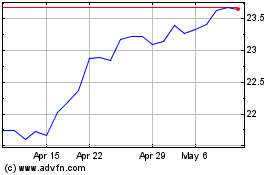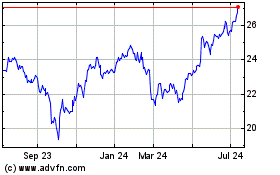Imperial Brands CEO, Big Tobacco's Longest-Serving Boss, Unexpectedly Quits
October 03 2019 - 5:43AM
Dow Jones News
By Saabira Chaudhuri
LONDON -- The chief executive of Imperial Brands PLC -- Big
Tobacco's longest-serving CEO -- has unexpectedly resigned, the
latest fallout from the mounting regulatory headwinds buffeting the
industry.
Imperial, which sells brands like Davidoff and Winston, said
Thursday it would start searching for a replacement for Alison
Cooper, who will leave once a successor is found.
Ms. Cooper was asked by the board to resign in a telephone
meeting late Wednesday, according to a spokesman, who cited the
increasingly complex environment.
"The board is in agreement that it's time for some fresh
thinking," he said.
The move adds to uncertainty at Imperial, which is already
searching for a new chairman and last week warned its sales and
profit would be lower than expected this year.
The company, more than many rivals, has been under pressure
following the Trump administration's plans, announced last month,
to ban most vaping products in the U.S. Its shares, little changed
Thursday, are down about 15% over the past month.
Ms. Cooper, one of only a handful of women to hold the top job
at a FTSE 100 company, joined Imperial 20 years ago, steadily
working her way up the ranks to become CEO in 2010.
Since taking the top job, the 53-year-old has led Imperial
through a time of huge change: the industry's focus has pivoted
toward so-called next-generation products like e-cigarettes and
devices that heat but don't burn tobacco as traditional cigarette
volumes continued to drop and regulatory hurdles rise.
Ms. Cooper has attempted to shift Imperial's strategy to stay
abreast of the changing environment. In 2012, she launched a new
unit, with its own CEO, to explore vaping products. In 2015,
Imperial bought the Blu e-cigarette brand from Reynolds American
Inc. in the U.S., the world's biggest vaping market. Ms. Cooper
simultaneously pushed a cost-saving strategy, slashing the number
of brands Imperial sold while retaining smokers.
But she ignored the heat-not-burn sector even as rival Philip
Morris International Inc.'s device, IQOS, proved successful in
several key markets, an omission that was to damage investor
sentiment around the company in the years that followed.
Imperial is now far more focused on e-cigarettes than its major
rivals, leaving it more exposed to the regulatory crackdown on
vaping in the U.S. Regulators are taking a closer look at such
products following a surge in teenage vaping and a slew of
pulmonary illnesses, and even deaths, tied to e-cigarettes used for
marijuana.
Other countries have tightened restrictions on vaping devices
too. India recently said it was banning the sale of all
e-cigarettes, while China has stopped online sales of products made
by vaping giant Juul Labs Inc.
Imperial has separately struggled with its traditional tobacco
business, last week citing a tough environment in its Africa, Asia
and Australasia division as part of the reason it slashed profit
and sales estimates.
Analysts have also criticized the company's management for
accounting practices they say don't offer a true picture of
performance. Liberum analyst Nico von Stackelberg said the
company's shares trade lower than justified given its economic
prospects and that "the management of Imperial Brands are
contributing to the discount."
A spokesman for Imperial defended the company's accounting
policies but acknowledged it could improve transparency of its
results. He said Imperial intends to strip out one-off items, such
as the profit on sale of assets, from its adjusted profit measures
in the future.
Write to Saabira Chaudhuri at saabira.chaudhuri@wsj.com
(END) Dow Jones Newswires
October 03, 2019 05:28 ET (09:28 GMT)
Copyright (c) 2019 Dow Jones & Company, Inc.
Imperial Brands (QX) (USOTC:IMBBY)
Historical Stock Chart
From Mar 2024 to Apr 2024

Imperial Brands (QX) (USOTC:IMBBY)
Historical Stock Chart
From Apr 2023 to Apr 2024
